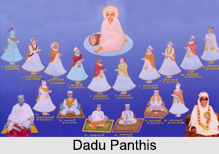 Dadu Panthis is the designation of the disciples or followers of Dadu, the founder of the Vaishnava sect. Dadu Panthis are one of the Vaishnava sects in India. The followers of this creed do not worship the visible image of any deity. The repetition (japa) of the name of Lord Rama is the only kind of adoration practised by them.
Dadu Panthis is the designation of the disciples or followers of Dadu, the founder of the Vaishnava sect. Dadu Panthis are one of the Vaishnava sects in India. The followers of this creed do not worship the visible image of any deity. The repetition (japa) of the name of Lord Rama is the only kind of adoration practised by them.
Origin of Dadu Panthi
The Dadu Panthi sect was founded by Dadu Dayal about the year 1600 A.D. Dadu was originally cotton cleaner at Ajmer. Dadu was cautioned by a voice from heaven to devote himself to a religious life. Thus, Dadu moved to the Baherana Mountain and after some time he disappeared from there and no traces of him could be found thereafter. The followers of Dadu i.e., the Dadu Panthis believed that he got absorbed into the deity Vishnu.
Appearance of Dadu Panthis
Dadu Panthis do not wear any peculiar mark on the forehead but carry a rosary. According to some people, Dadu Panthis can be further distinguished by a round white cap. But, according to others, Dadu Panthis can be recognized with four corners and a flap hanging down behind. Each Dadu Panthis need to manufacture this for himself.
Sections of Dadu Panthis
The Dadu Panthi sect has many followers in Ajmer and Mewar, and they are concentrated in Rajasthan. They are divided into lay and ascetic branches, which are again divided into several groups. The Khalsas, meaning "the pure, ruling" are based in Naraina where Dadu died. Here the head of all the Dadu Panthis lives and there is a great Mela, gathering, every year. The survivals of the naked Nagas, the warrior monks, live in the Jaipur region. The Utradis are a prosperous group from the Punjab, founded by Baba Banwari Das, who practise medicine and money-lending.
Two ascetic groups are the Virkat and the Khakis. The Virkat wear ochre clothes and study and teach the Bani and difficult Sanskrit texts. They cannot touch money and live on alms, continually travelling with a Master, often in large groups of up to 150 persons. The Khakis, meaning "ash-covered" wear little, have long coiled hair, are smeared with ash and practise austerities. They travel in small groups and believe that constant movement like a stream keeps them pure.




















